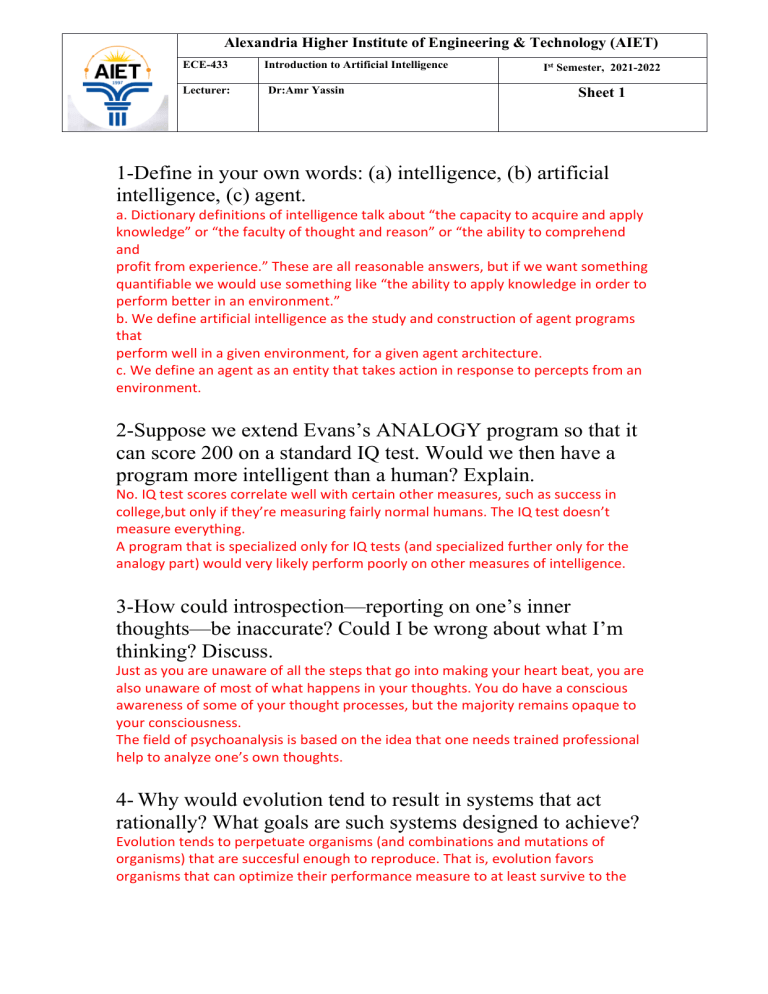
Alexandria Higher Institute of Engineering & Technology (AIET) ECE-433 Lecturer: Introduction to Artificial Intelligence Dr:Amr Yassin Ist Semester, 2021-2022 Sheet 1 1-Define in your own words: (a) intelligence, (b) artificial intelligence, (c) agent. a. Dictionary definitions of intelligence talk about “the capacity to acquire and apply knowledge” or “the faculty of thought and reason” or “the ability to comprehend and profit from experience.” These are all reasonable answers, but if we want something quantifiable we would use something like “the ability to apply knowledge in order to perform better in an environment.” b. We define artificial intelligence as the study and construction of agent programs that perform well in a given environment, for a given agent architecture. c. We define an agent as an entity that takes action in response to percepts from an environment. 2-Suppose we extend Evans’s ANALOGY program so that it can score 200 on a standard IQ test. Would we then have a program more intelligent than a human? Explain. No. IQ test scores correlate well with certain other measures, such as success in college,but only if they’re measuring fairly normal humans. The IQ test doesn’t measure everything. A program that is specialized only for IQ tests (and specialized further only for the analogy part) would very likely perform poorly on other measures of intelligence. 3-How could introspection—reporting on one’s inner thoughts—be inaccurate? Could I be wrong about what I’m thinking? Discuss. Just as you are unaware of all the steps that go into making your heart beat, you are also unaware of most of what happens in your thoughts. You do have a conscious awareness of some of your thought processes, but the majority remains opaque to your consciousness. The field of psychoanalysis is based on the idea that one needs trained professional help to analyze one’s own thoughts. 4- Why would evolution tend to result in systems that act rationally? What goals are such systems designed to achieve? Evolution tends to perpetuate organisms (and combinations and mutations of organisms) that are succesful enough to reproduce. That is, evolution favors organisms that can optimize their performance measure to at least survive to the age of sexual maturity, and then be able to win a mate. Rationality just means optimizing performance measure, so this is in line with evolution. 5-Examine the AI literature to discover whether the following tasks can currently be solved by computers: a. Playing a decent game of table tennis (Ping-Pong). b. Driving in the center of Cairo, Egypt. (driving in Cairo) No. Although there has been a lot of progress in automated driving, all such systems currently rely on certain relatively constant clues: that the road has shoulders and a center line, that the car ahead will travel a predictable course, that cars will keep to their side of the road, and so on. To our knowledge, none are able to avoid obstacles or other cars or to change lanes as appropriate; their skills are mostly confined to staying in one lane at constant speed. Driving in downtown Cairo is too unpredictable for any of these to work. d. Buying a week’s worth of groceries at the market. e. Buying a week’s worth of groceries on the Web. f. Discovering and proving new mathematical theorems. g. Giving competent legal advice in a specialized area of law. h. Performing a complex surgical operation. 6-Are reflex actions (such as flinching from a hot stove) rational? Are they intelligent? Yes, they are rational, because slower, deliberative actions would tend to result in more damage to the hand. If “intelligent” means “applying knowledge” or “using thought and reasoning” then it does not require intelligence to make a reflex action. 7- “Surely computers cannot be intelligent—they can do only what their programmers tell them.” Is the latter statement true, and does it imply the former? This depends on your definition of “intelligent” and “tell.” In one sense computers only do what the programmers command them to do, but in another sense what the programmers consciously tells the computer to do often has very little to do with what the computer actually does. Anyone who has written a program with an ornery bug knows this, as does anyone who has written a successful machine learning program. So in one sense Samuel “told” the computer “learn to play checkers better than I do, and then play that way,” but in another sense he told the computer “follow this learning algorithm” and it learned to play. So we’re left in the situation where you may or may not consider learning to play checkers to be s sign of intelligence (or you may think that learning to play in the right way requires intelligence, but not in this way), and you may think the intelligence resides in the programmer or in the computer.

